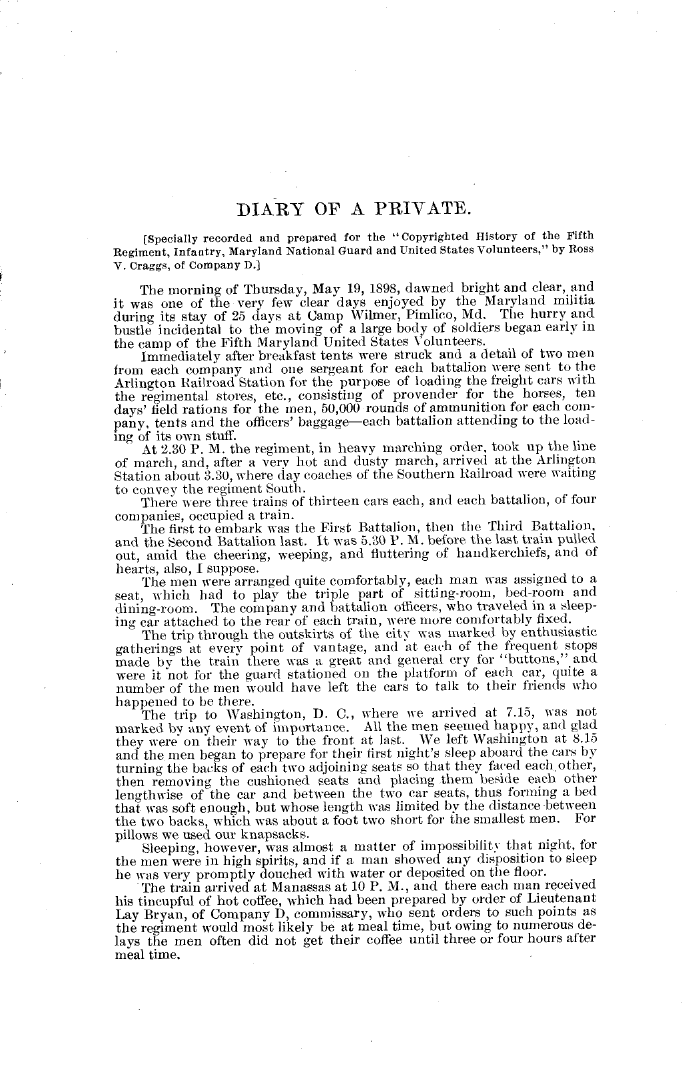 |
||||
 |
||||
| DIARY OF A PRIVATE. [Specially recorded and prepared for the " Copyrighted History of the Fifth Regiment, Infantry, Maryland National Guard and United States Volunteers," by Ross V. Craggs, of Company D.] The morning of Thursday, May 19, 1898, dawned bright and clear, and it was one of the very few clear days enjoyed by the Maryland militia during its stay of 25 days at Camp Winner, Pimlico, Md. The hurry and bustle incidental to the moving of a large body of soldiers began early in the camp of the Fifth Maryland United States Volunteers. Immediately after breakfast tents were struck and a detail of two men irom each company and one sergeant for each battalion were sent to the Arlington Railroad Station for the purpose of loading the freight cars with the regimental stores, etc., consisting of provender for the horses, ten days' field rations for the men, 50,000 rounds of ammunition for each company, tents and the officers' baggage—each battalion attending to the loading of its own stuff. At 2.30 P. M. the regiment, in heavy marching order, took up the line of march, and, after a very hot and dusty march, arrived at the Arlington Station about 3.30, where day coaches of the Southern Railroad were waiting to convey the regiment South. There were three trains of thirteen cars each, and each battalion, of four companies, occupied a train. The first to embark was the First Battalion, then the Third Battalion, and the Second Battalion last. It was 5.30 P. M. before the last train pulled out, amid the cheering, weeping, and fluttering of handkerchiefs, and of hearts, also, I suppose. The men were arranged quite comfortably, each man was assigned to a seat, which had to play the triple part of sitting-room, bed-room and dining-room. The company and battalion officers, who traveled in a sleeping car attached to the rear of each train, were more comfortably fixed. The trip through the outskirts of the city was marked by enthusiastic gatherings at every point of vantage, and at each of the frequent stops made by the train there was a great and general cry for "buttons," and were it not for the guard stationed on the platform of each car, quite a number of the men would have left the cars to talk to their friends who happened to be there. The trip to Washington, D. C., where we arrived at 7.15, was not marked by an)' event of importance. All the men seemed happy, and glad they were on their way to the front at last. We left Washington at 8.15 and the men began to prepare for their first night's sleep aboard the cars by turning the backs of each two adjoining seats so that they faced each other, then removing the cushioned seats and placing them beside each other lengthwise of the car and between the two car seats, thus forming a bed that was soft enough, but whose length was limited by the distance between the two backs, which was about a foot two short for the smallest men. For pillows we used our knapsacks. Sleeping, however, was almost a matter of impossibility that night, for the men were in high spirits, and if a man showed any disposition to sleep he was very promptly douched with water or deposited on the floor. The train arrived at Manassas at 10 P. M., and there each man received his tincupful of hot coffee, which had been prepared by order of Lieutenant Lay Bryan, of Company D, commissary, who sent orders to such points as the regiment would most likely be at meal time, but owing to numerous delays the men often did not get their coffee until three or four hours after meal time. |